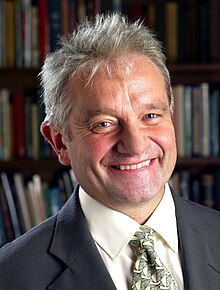Paul Nurse
Appearance

Sir Paul Maxime Nurse, FRS (born 25 January 1949) is a British biochemist. He was awarded the 2001 Nobel Prize in Physiology or Medicine with Leland H. Hartwell and R. Timothy Hunt for their discoveries regarding cell cycle regulation by cyclin and cyclin dependent kinases.
| This scientist article is a stub. You can help out with Wikiquote by expanding it! |
Quotes
[edit]- How scientists go about their job: and it's a process, it's a question of asking questions, respecting observation, respecting experiment, having tentative explanations and then testing them.... There is a problem sometimes with how we teach science at schools. Because we sometimes teach it as if it has been chiseled in stone.
- in Charlie Rose Science Series: The Imperative of Science with Paul Nurse, President of Rockefeller University, Harold Varmus, president of Memorial Sloan-Kettering Cancer Center, Shirley Ann Jackson, President of Rensselaer Polytechnic Institute, Bruce Alberts, Editor-In-Chief of Science and Lisa Randall of Harvard University.
"Life, Logic and Information" (July 1, 2008)
[edit]- Nature
- Even at the level of the cell, phenomena such as general cellular homeostasis and the maintenance of cell integrity, the generation of spatial and temporal order, inter- and intracellular signalling, cell 'memory' and reproduction are not fully understood. ...This is also true for the levels of organization seen in tissues, organs and organisms, which feature more complex phenomena such as embryonic development and operation of the immune and nervous systems.
- We need to focus more on how information is managed in living systems and how this brings about higher level biological phenomena... more investigation into how living systems gather, process, store and use information, as was emphasized at the birth of molecular biology.
- DNA can act as a digital information storage device that can be precisely copied. Similarly, the mechanism of the lac operon... can be described in terms of molecular interactions between DNA, protein and metabolites. But these interactions make sense only when they are translated into a negative feedback loop...
- We need to describe the molecular interactions and biochemical transformations that take place in living organisms, and then translate these descriptions into the logic circuits that reveal how information is managed. This analysis should not be confined to the flow of information from gene to protein, but should also be applied to all functions operating in cells and organisms, including chemical interactions and transformations as well as physical phenomena, such as electrical signalling and mechanical processes.
Newsnight 30th March 2011
[edit]- Ever since Sir Isaac Newton's times, scientists have worked in the same sort of way:
- They show a great respect for experiment and observation,
- They don't cherry pick data,
- They take a skeptical approach to what they do.
- And then scientists work together to get a consensus as to what should be believed
- And that generates very reliable knowledge and that reliable knowledge drives innovation
- Source: BBC iplayer, 37 mins online
Quotes about Nurse
[edit]- This notion of information being at the heart of life... is not restricted to me. I'm in good company. Sir Paul Nurse, former president of the Royal Society, in his visionary essay in Nature, "Life, Logic and Information", extols the virtues of thinking in an information, web-based way about life, and how, instead of worrying too much about what is going on at the molecular level, we should think of life as being a collection of logic modules... with information flowing between them, and control systems... a sort of engineering approach.
- Paul Davies, "The Demon in the Machine by Paul Davies" (Sep 7, 2019) 6th International FQXi Conference, "Mind Matters: Intelligence and Agency in the Physical World" 7:42.

